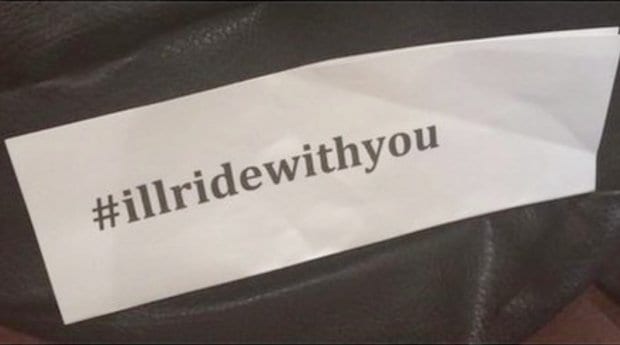“Suffering. In my profession, there is no chance of unemployment,” veteran reporter Marie Colvin wrote in a 2001 piece in The Sunday Times, more than a decade before she was killed covering the miasma that is Syria’s civil war. “The real difficulty is having enough faith in humanity to believe someone will care.”
As 2014 wound down, the hostage standoff at a Sydney, Australia, café guaranteed an uptick in anti-Muslim sentiment. But then there was this: a train passenger named Rachael Jacobs sees a fellow passenger removing her hijab as the drama unfolds, runs after her after she disembarks, urges her to put it back on, and offers to walk with her — a spontaneously simple act of compassion that in turn sparked the #illridewithyou hashtag that moved other Aussie commuters to offer to travel with Muslims fearful of backlash.
“I was going to drive to work tomorrow but seeing the outpouring of support changed my mind,” tweeted one woman who usually wears a hijab. “Thank you. See you on the train!”
As challenging as Jacobs’s empathetic outreach is to our learned prejudices, responses like hers are necessary if we are to continue to have faith — in our neighbours, co-workers, people with whom we share cities, countries and, ultimately, the world, which on many a day in 2014 seemed to be spinning out of control.
Nine months after it vanished off the radar, presumably plunging into the waters off Australia’s west coast, Malaysia flight 370 and its 239 passengers cannot be found. Since then, we’ve borne witness to a seemingly endless list of events known by one and two-word titles or their Twitter tags — threats or crises that were awakened from a dormant or invisible state, tipped the balance in favour of public rage, or took on a new façade.
Ebola. Boko Haram. ISIS/ISIL/IS. Ukraine. Ferguson. #BlackLivesMatter. #ICantBreathe. Climate change. Gender-based violence …
And then there were the stories that ignited sparks of qualified hope: The long overdue American outreach to Cuba. Ugandans, who celebrated their Constitutional Court’s ruling against the Anti-Homosexuality Bill in August, only to see a harsher bill resurface a few months later. Michael Sam, whose inspiring path to the NFL draft has yet to translate into a spot on a team and a prime-time moment on the field. We are called to be brave … in spite of. “Bravery is not being afraid to be afraid,” Colvin noted upon receiving an award for her work in Sri Lanka, where she lost an eye from grenade-scattered shrapnel and took to wearing a signature black patch.
In any given year, there are media-magnet events. But there are also small gestures that indicate that we all aren’t resigned to anger or fear — of the next pandemic, the next beheading, the next mass shooting. Still, there are years when I’ve felt more hopeful about a new year. Like 2011, when the Arab Spring ignited and swept away the dictatorial likes of Tunisia’s Zine El Abidine Ben Ali, Egypt’s Hosni Mubarak and Libya’s Moammar Gadhafi, while the people in the Middle East emptied into the streets and thousands of Occupiers around the world did the same.
That fighting activist spirit infused seeds of change that continue to grow through movements like Idle No More; anti-pipeline protests; renewed rage against the trenchant, institutional racism that plagues American and other societies; and revitalized discussion about entrenched harassment and violence against women.
On the cusp of 2015, I can’t say I feel that buzz of optimism I had at the end of 2011. I struggle to find the forest of hope through the trees of relentless turmoil, which is often the incubator of change, even progress. #LookingForwardToBreathing in 2015.
Natasha Barsotti is the staff reporter at Xtra Vancouver.


 Why you can trust Xtra
Why you can trust Xtra


